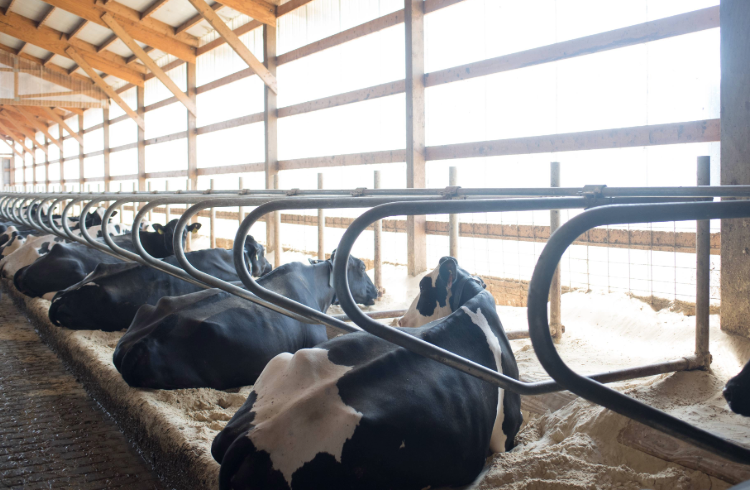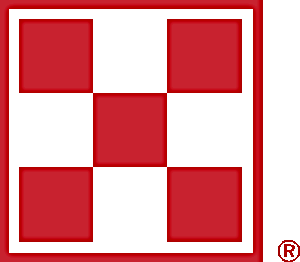
The end of the short winter signals the beginning of prolonged warm days, prompting dairy farmers to evaluate their heat stress management plan. The challenge lies in ensuring their cows remain productive and healthy despite the heat. Heat stress not only compromises cow comfort but also can impact milk production and overall herd health.
Visual signs of heat stress
Dairy cows are inherently vulnerable to heat stress when the temperature-humidity index (THI) exceeds 68°F or at about 72°F.1 Recognizing the visual signs of heat stress is pivotal for prompt intervention and effective management.
Heat stress in dairy cows manifests through various visual cues and physiological responses that signal their discomfort and reaction to heat, including:
- Respiratory distress – Heat-stressed cows display increased respiratory rates with some resorting to panting to dissipate excess heat.
- Activity changes – Cows may show decreased activity levels, exhibiting signs of restlessness and spending less time lying down.2
- Lethargy and weakness – Cows experiencing heat stress often appear weak and lethargic, displaying a lack of energy.
- Altered feeding behavior – Heat stress can disrupt normal feeding patterns, leading to disinterest in feed and a decline in cud chewing.
Ways to support cows through heat stress with nutrition
At times, it’s hard to predict when heat stress will affect your herd. However, having a plan in place to address it promptly is crucial. Here are four nutrition strategies to consider as warmer days approach:
- Maintain intake and energy balance – Heat stress often leads to reduced dry matter intake, depriving cows of essential nutrients. Purina® Rally® Dairy Feed can support intake and provide the right type of energy to cows during periods of elevated temperatures. This product has been reliable for years providing a positive intake response to second lactation and older cows. Studies demonstrate that Rally Dairy Feed increases DMI by 3.3 pounds per cow, striving to maintain energy levels despite reduced intake.3
- Utilize highly digestible feeds – Feeding highly digestible forages and adjusting the ration’s energy density with the addition of fats can help meet cow’s energy requirements without exacerbating heat production during rumen fermentation. Consult with a Purina nutritionist on how to balance fatty acid levels to ensure efficient energy utilization and increase milk production by 3.6 pounds during heat stress.4
- Additive utilization – Incorporating feed additives tailored to heat stress management can offer additional nutritional support. Additives that improve feed efficiency, support immune function, and reduce oxidative stress can decrease the negative effects of heat stress on performance.
- Mineral and electrolyte management – Heat stress creates mineral imbalances, particularly potassium loss through sweat. Adjusting mineral levels in the ration helps maintain electrolyte balance. Increasing the level of conventional mineral products like potassium carbonate and sodium bicarbonate in a ration is an economical option. In acute situations, supplementing with electrolytes can help replenish lost nutrients.
Don’t let the heat dampen your herd’s potential. Work with your nutritionist to manage heat stress and help your cows reach their peak performance and profit potential. Reach out to your local Purina representative or visit purinamills.com for more information.
References
1 Heat Stress Abatement Techniques for Dairy Cattle. Penn State Extension. Nov. 2022. Available at: https://extension.psu.edu/heat-stress-abatement-techniques-for-dairy-cattle.
2 The Effectiveness of Heat Stress Abatement Systems on Behavior and Performance of Lactating Dairy Cows in NNY. Northern New York Agricultural Development Program 2016 Project Report. NNYADP16HeatStressCowsFinal (nnyagdev.org)
3 DC525 and DC537
4 K. A. Davison, R. O. Rodrigues, J. A. Davidson, N. M. Barkley, A. L. Kenny, E. C. Adkins and M. R. Waldron, University of Missouri, Columbia, Purina Animal Nutrition Center, Gray Summit, MO. Effects of a commercial feed additive on production losses during acute heat stress conditions in Holstein dairy cows, 2013 American Dairy Association Annual Meeting, Indianapolis, Ind.

Purina Animal Nutrition LLC (purinamills.com) is a national organization serving producers, animal owners and their families through more than 4,700 local cooperatives, independent dealers and other large retailers throughout the United States. Driven to unlock the greatest potential in every animal, the company is an industry-leading innovator offering a valued portfolio of complete feeds, supplements, premixes, ingredients and specialty technologies for the livestock and lifestyle animal markets. Purina Animal Nutrition LLC is headquartered in Arden Hills, Minn., and is a wholly owned subsidiary of Land O’Lakes, Inc.


